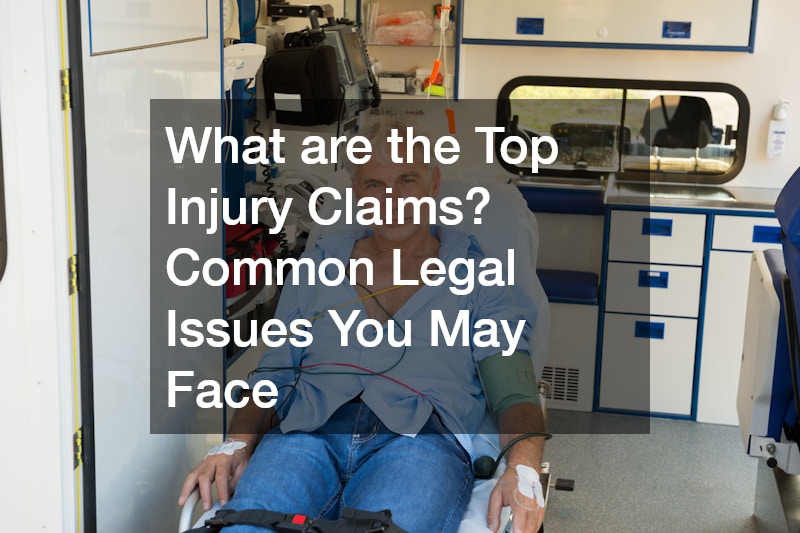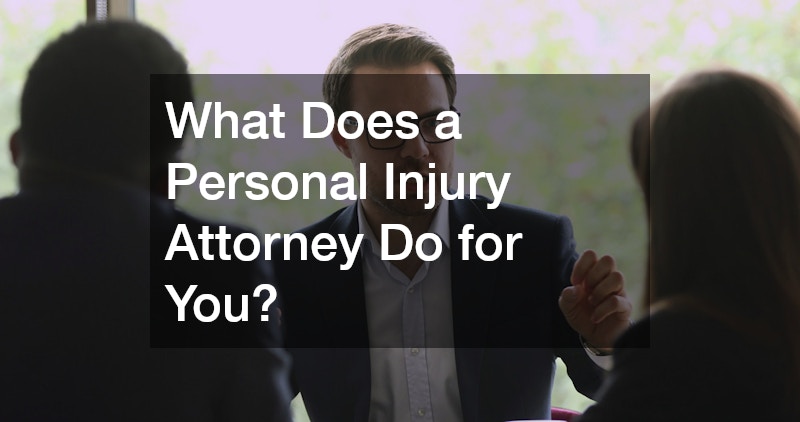Personal injuries are unexpected events that can disrupt lives in profound ways, leaving victims with medical expenses, lost income, emotional trauma, and legal complications. In the realm of personal injury law, understanding the most common types of claims—and the challenges that accompany them—is essential for anyone who wants to safeguard their rights. Injuries can occur in car accidents, workplace mishaps, slip-and-fall incidents, or through defective products. Each scenario carries its own legal implications, which can make navigating the system confusing and intimidating without the right knowledge or professional assistance.
Knowing the top injury claims not only prepares you for the potential hazards of daily life but also provides insight into how courts and insurance companies typically approach such cases. For example, car accident claims often involve questions of fault and negligence, while workplace injury claims require consideration of employer responsibility and workers’ compensation laws. Slip-and-fall accidents may raise issues of property owner liability, and product liability claims examine whether a manufacturer or retailer failed in their duty to provide safe products.
Equally important is understanding the legal challenges associated with injury claims. Victims often face difficulties proving negligence, dealing with aggressive insurance adjusters, or overcoming common defenses presented by the other party. Even when a claim is valid, calculating fair compensation can be complex, as it must consider medical bills, lost wages, pain and suffering, and future expenses. From identifying a valid claim to knowing when to hire a personal injury lawyer, this discussion will give you a clearer perspective on how to manage the legal and practical aspects of an injury case.
1. What are the most common types of personal injury claims?
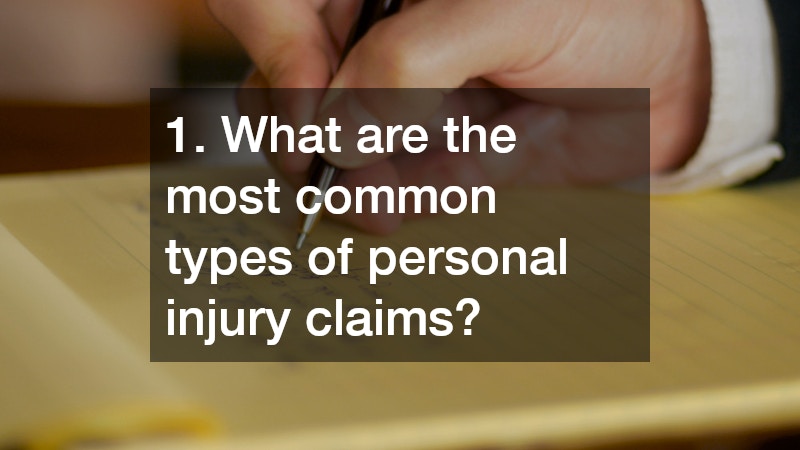
Personal injury law encompasses a wide range of claims, but several categories are particularly common. Car accidents are at the top of the list, with millions of collisions reported annually. Victims often seek compensation for medical expenses, property damage, and lost wages. Slip-and-fall accidents are another leading category, especially in public places or private properties where unsafe conditions exist.
Workplace injuries also account for a significant portion of claims. These can include anything from repetitive stress injuries to accidents involving heavy machinery. In such cases, workers’ compensation laws usually apply, but sometimes additional personal injury claims arise if third-party negligence contributed to the accident.
Other common claims include medical malpractice, where healthcare professionals fail to meet the standard of care, and product liability, which holds manufacturers accountable for defective goods.
Personal injury lawyers play a critical role in these cases, helping victims understand which category their claim falls under and what legal standards apply. Their expertise ensures victims don’t overlook crucial details that could determine the success of their case.
2. How do I determine if my claim is valid?
Determining whether a personal injury claim is valid requires examining several factors. First, there must be proof of injury, supported by medical records and expert evaluations. Second, the injury must have been caused by another party’s negligence, recklessness, or intentional misconduct. Finally, there must be measurable damages—such as medical expenses, lost wages, or emotional distress—that can be linked to the injury.
For example, if a driver runs a red light and causes a collision, the injured party may have grounds for a valid claim. Similarly, if a property owner fails to repair a broken staircase and someone falls, liability may exist.
A local motorcycle accident lawyer can help assess validity, particularly in cases where the circumstances are complex. Their knowledge of local traffic laws, court precedents, and insurance regulations can make the difference between pursuing a successful claim and wasting time on one with little chance of success.
3. What steps should I take immediately after an injury?
The moments following an injury are crucial. The first step is always to seek medical attention, even if the injury appears minor. Medical documentation provides a record that can be vital for later legal proceedings. Next, victims should collect as much evidence as possible, including photographs of the scene, witness contact information, and any police or incident reports.
It is also wise to notify relevant parties, such as employers in workplace accidents or property owners in slip-and-fall cases. Avoid making statements that admit fault, as these can be used against you later.
Consulting with drunk driving lawyers or other specialized attorneys may be necessary if alcohol or substance use played a role in the incident. These professionals can guide you on the best way to preserve evidence and build a strong case.
4. How can I prove negligence in my personal injury case?
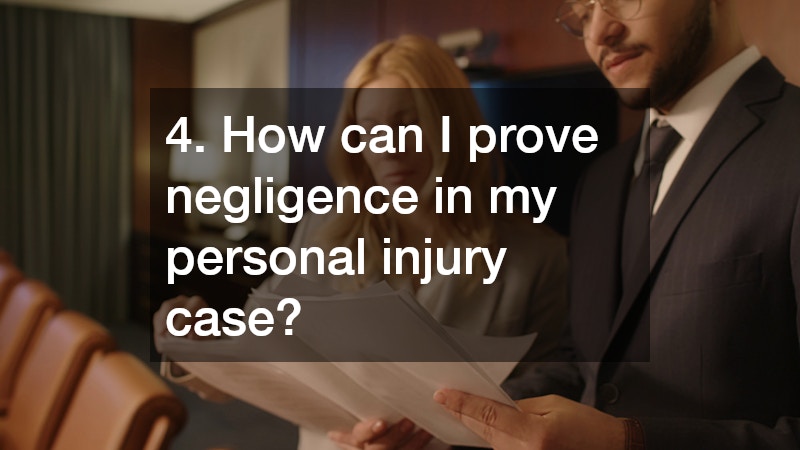
Negligence is the foundation of most personal injury claims, and proving it requires establishing four elements: duty of care, breach of that duty, causation, and damages. For instance, drivers have a duty to operate vehicles safely. If a driver texts while driving and causes an accident, that duty is breached. If the breach directly causes injuries and the victim suffers damages, negligence is established.
Evidence can come in many forms, including eyewitness testimony, expert analysis, and physical documentation such as accident reports or medical records.
Working with a truck accident attorney can be invaluable when proving negligence, particularly in cases involving commercial vehicles where multiple parties—such as trucking companies or maintenance providers—may share responsibility.
5. What are common defenses against personal injury claims?
Defendants in personal injury cases often rely on several common defenses. One is comparative negligence, which argues that the victim was partially responsible for the accident. If proven, this can reduce the amount of compensation awarded. Another defense is assumption of risk, where the defendant claims the victim knowingly engaged in a dangerous activity.
Some defendants argue that the statute of limitations has expired, meaning the claim was filed too late. Others may dispute the severity of the injuries or claim they were preexisting.
In situations involving alcohol-related accidents, consulting a DUI attorney is essential. These professionals understand how intoxication impacts liability and can counter defenses designed to minimize responsibility.
6. How is compensation calculated in personal injury cases?
Compensation, often referred to as damages, is typically divided into two categories: economic and non-economic. Economic damages cover tangible losses such as medical bills, rehabilitation costs, and lost income. Non-economic damages address intangible harms, such as pain and suffering, emotional distress, or loss of companionship.
In rare cases, punitive damages may also be awarded to punish particularly reckless or malicious behavior.
An accident attorney evaluates all these factors, working with medical experts, economists, and other professionals to calculate fair compensation. Without such expertise, victims risk settling for less than they deserve.
7. What role does insurance play in personal injury claims?
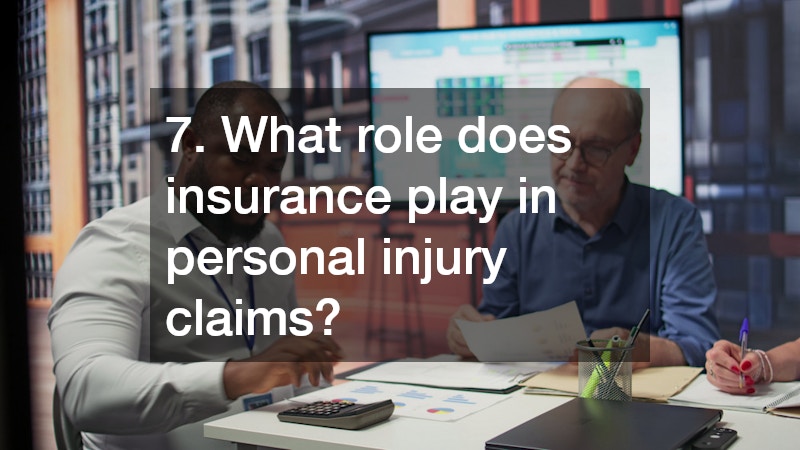
Insurance companies are central to most personal injury cases, as they are usually responsible for paying compensation. However, their goal is to minimize payouts. Adjusters may challenge the severity of injuries, question liability, or push for quick settlements that favor the insurer. In some cases, they may even request recorded statements from victims, hoping to use inconsistencies against them later. This makes it crucial for claimants to be cautious and avoid direct negotiations without proper guidance.
It is important to remember that insurance companies are not neutral parties. Their interests often conflict with those of the injured individual. While they may appear cooperative, their primary responsibility is to protect the company’s bottom line.
Local criminal defense attorneys may not always specialize in injury law, but their experience with negotiation and litigation can sometimes be applied when dealing with aggressive insurers. More often, personal injury attorneys with strong negotiation skills are the best advocates for ensuring fair treatment from insurance companies. They understand insurer tactics, can calculate the true value of claims, and are prepared to take cases to trial if fair settlements are not offered. This persistence helps level the playing field for injured victims.
8. How long does it take to settle a personal injury claim?
The timeline for settling a personal injury claim varies widely. Simple cases may resolve in a few months, while complex cases involving severe injuries or disputed liability can take years. Factors that influence the timeline include the extent of medical treatment required, the willingness of the insurance company to negotiate, and whether the case proceeds to trial. Cases that require expert testimony or involve multiple defendants typically take longer, as each party may file motions, request additional evidence, or dispute liability.
During this period, it is essential to stay patient and continue documenting medical progress and financial losses. Keeping thorough records of every doctor’s visit, prescription, therapy session, and missed workday strengthens your case and provides clear evidence of ongoing damages.
Experienced defense attorneys on the opposing side often use delay tactics to pressure victims into accepting lower settlements. These tactics may include disputing medical records, requesting repeated evaluations, or prolonging discovery. Having your own attorney ensures that these tactics are countered effectively and that your claim continues to move forward, protecting your right to fair compensation. Skilled representation can also help identify opportunities for early resolution through mediation or arbitration, potentially shortening the process without sacrificing results.
9. What are typical warning signs of a weak personal injury case?
Not every injury claim is strong. Warning signs of a weak case include lack of medical documentation, absence of witnesses, or situations where liability is unclear. Claims may also weaken if the victim delays seeking treatment, as this allows the opposing party to argue the injuries were unrelated to the accident. Consistent medical records, photographs of the injury, and timely reporting to authorities or insurers often make the difference between a strong and weak claim.
Another red flag is when damages are minimal, such as minor injuries that did not require medical intervention. Insurance companies are less likely to settle generously in such cases, especially if financial losses like missed workdays or ongoing treatment cannot be demonstrated. Similarly, inconsistencies in the victim’s account of events or conflicting statements from witnesses may raise doubts about credibility, further weakening the case.
A federal criminal defense lawyer may not typically handle personal injury matters, but their analytical skills can be useful when evaluating the strength of evidence in complex cases. However, personal injury specialists remain the best resource for assessing claim viability. Their expertise allows them to identify weaknesses early, provide strategies to strengthen the claim, and offer realistic expectations about potential outcomes.
10. When should I consider hiring a personal injury attorney?
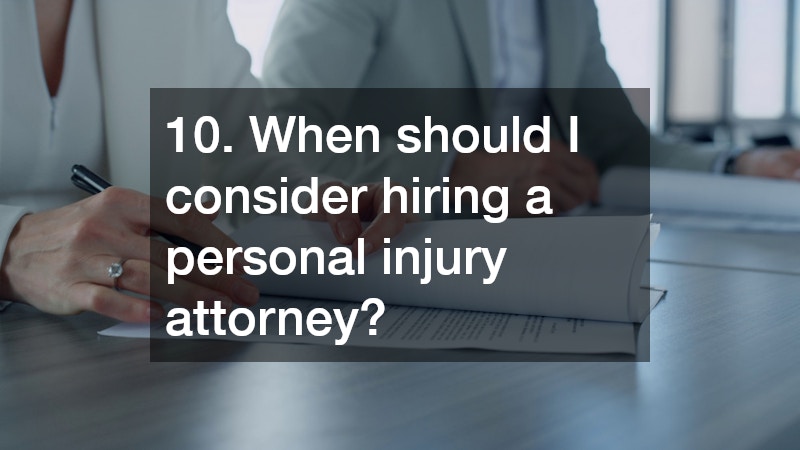
Hiring an attorney is often the smartest decision you can make after sustaining a serious injury. If your case involves significant medical expenses, long-term recovery, or disputed liability, professional guidance is essential. Attorneys handle negotiations, gather evidence, and represent you in court if necessary. Their involvement also ensures that deadlines for filing claims are met and that all paperwork is properly completed, preventing costly mistakes that could jeopardize your case.
Additionally, an attorney can identify when a settlement offer is inadequate and advise on whether to pursue litigation. They can also enlist expert witnesses, such as medical professionals or accident reconstruction specialists, to strengthen your claim. Without legal representation, victims risk being taken advantage of by insurers or opposing counsel, often accepting far less compensation than they deserve.
In extreme cases, where accidents intersect with federal crimes such as fraud or reckless conduct crossing state lines, legal complexities intensify. Here, having a skilled personal injury attorney ensures your case is approached with the necessary legal sophistication. They can coordinate with federal courts, manage multi-jurisdictional issues, and ensure that every legal angle is thoroughly explored, maximizing your chances of a favorable outcome.
Conclusion
Understanding the top injury claims and their legal challenges is fundamental for navigating the personal injury system effectively. From car accidents and workplace injuries to medical malpractice and product liability, each type of claim carries unique requirements and potential defenses. Knowing how to prove negligence, recognize weak claims, and calculate fair compensation empowers victims to protect their rights.
Equally important is recognizing the role of insurance companies and defense strategies, as these factors often determine the outcome of a claim. By consulting with skilled attorneys—whether personal injury lawyers or specialists in related fields—victims increase their chances of securing just compensation.
Ultimately, knowledge is the first step toward justice. By being informed about common injury claims and legal hurdles, individuals can take proactive steps to safeguard their financial, physical, and emotional well-being after an accident.
